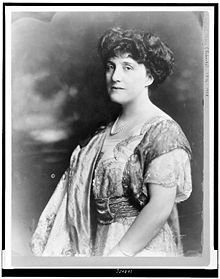Mary Roberts Rinehart (August 12, 1876 – September 22, 1958) |
|
Mary Roberts Rinehart was an American writer, often called the American Agatha Christie, although her first mystery novel was published 14 years before Christie's first novel in 1922. Rinehart is considered the source of the phrase "The butler did it" from her novel The Door (1930), although the novel does not use the exact phrase. Rinehart is also considered to have invented the "Had-I-But-Known" school of mystery writing, with the publication of The Circular Staircase (1908). She also created a costumed super-criminal called "the Bat", cited by Bob Kane as one of the inspirations for his "Batman". Mary Roberts Rinehart was born Mary Ella Roberts in Allegheny City, Pennsylvania, now a part of Pittsburgh. Her father was a frustrated inventor, and throughout her childhood, the family often had financial problems. Left-handed at a time when that was considered inappropriate, she was trained to use her right hand instead. She attended public schools and graduated at age 16, then enrolled at the Pittsburgh Training School for Nurses at Pittsburgh Homeopathic Hospital, where she graduated in 1896. She described the experience as "all the tragedy of the world under one roof." After graduation, she married Stanley Marshall Rinehart (1867–1932), a physician she had met there. They had three sons and one daughter: Stanley Jr., Frederick, Alan, and Elizabeth Glory. During the stock market crash of 1903, the couple lost their savings, spurring Rinehart's efforts at writing as a way to earn income. She was 27 that year, and produced 45 short stories. In 1907, she wrote The Circular Staircase, the novel that propelled her to national fame. According to her obituary in the Pittsburgh Post-Gazette in 1958, the book sold 1.25 million copies. Her regular contributions to The Saturday Evening Post were immensely popular and helped the magazine mold American middle-class taste and manners. In 1911, after the publication of five successful books and two plays, the Rineharts moved to Glen Osborne, Pennsylvania, where they purchased a large home at the corner of Orchard and Linden Streets called "Cassella." However, Mrs. Rinehart had to have the house completely rebuilt, as it had fallen into disrepair. “The venture was mine, and I had put every dollar I possessed into the purchase. All week long I wrote wildly to meet the payroll and contractor costs,” she wrote in her autobiography. In 1925, the Rinehart's sold the house to the Marks family and the house was demolished in 1969. Today, a Mary Roberts Rinehart Nature Park sits in the borough of Glen Osborne at 1414 Beaver Street, Sewickley, Pennsylvania. Rinehart’s commercial success sometimes conflicted with her domestic roles of wife and mother, yet she often pursued adventure, including a job as a war correspondent for The Saturday Evening Post at the Belgian front during World War I. During her time in Belgium, she interviewed Albert I of Belgium, Winston Churchill and Mary of Teck, writing of the latter, "This afternoon I am to be presented to the queen of England. I am to curtsey and to say 'Your majesty,' the first time!” Rinehart was working in Europe in 1918 to report on developments to the War Department and was in Paris when the armistice was signed. In 1922, she and her family moved to Washington, DC. Her husband died in 1932, but she continued to live in Washington until 1935, when she moved to New York City. There she helped her sons found the publishing house Farrar & Rinehart, serving as its director. She also maintained a vacation home in Bar Harbor, Maine, where she was involved in a real-life drama in 1947. Her Filipino chef, who had worked for her for 25 years, fired a gun at her and then attempted to slash her with knives, until other servants rescued her. The chef committed suicide in his cell the next day. Rinehart suffered from breast cancer, which led to a radical mastectomy. She eventually went public with her story, at a time when such matters were not openly discussed. The interview "I Had Cancer" was published in a 1947 issue of the Ladies' Home Journal; in it, Rinehart encouraged women to have breast examinations. The Rinehart career was crowned with a Mystery Writers of America Special Award a year after she published her last novel ... and by the award, as early as 1923, of an honorary Doctorate in Literature from George Washington University. On November 9, 1956, Rinehart appeared on the CBS Television interview program Person to Person. She died at age 82 at her apartment at 630 Park Avenue in New York City. |
|
Previous Page |
Return Home |